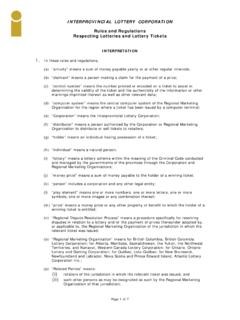Transcription of Mandragola - The University of Sydney
1 Niccol Machiavelli Mandragola translated by Nerida Newbigin Based on the 1519 manuscript published in La Mandragola : storia e filologia. Con l edizione critica del testo secondo il Laurenziano Redi 129, ed. Pasquale Stoppelli (Rome: Bulzoni, 2005), with reference also to Niccol Machiavelli, Mandragola , ed. Pasquale Stoppelli (Milan: Mondadori, 2006) Translation Nerida Newbigin 2009 NOTES ON THIS TRANSLATION I have enjoyed reading this text with students for many years, but have usually found that they need assistance in reading it in Italian. I hope that this translation will be used principally as an adjunct to a close reading of the Italian text, and perhaps as a point of reference for the preparation of a performance text. I have based my translation on the edition prepared by Pasquale Stoppelli from the 1519 manuscript: La Mandragola : storia e filologia.
2 Con l edizione critica del testo secondo il Laurenziano Redi 129, ed. Pasquale Stoppelli (Rome: Bulzoni, 2005). I have also made use of the notes in Niccol Machiavelli, Mandragola , ed. Pasquale Stoppelli (Milan: Mondadori, 2006). Some of my thoughts on the play are published in Machiavelli, Pirandello, and Their donne di virt , Pirandello Studies, 28 (2008): 48 67. CAST CALLIMACO SIRO MESSER NICIA LIGURIO SOSTRATA FRIAR TIMOTEO A WOMAN LUCREZIA Prologue God save you all, benevolent spectators! And since it seems your kindness depends upon this play being pleasing to you, if you continue to keep quiet and still we ll tell you all about a recent case that happened in this city. You see this set, erected upon the stage before you: it represents your Florence; some other time it will be Rome or Pisa, and hugely entertaining, not a teaser.
3 Behind the door on my right hand there lives a judge so bovine that he must have learned law from Bo fius. That alley round the corner there is called the Via dello Amore: and he who falls there rises not again. You ll recognize with ease from his conventual habit what kind of prior or abbot lives in the church located opposite, provided that you stay until the end. A young man called Callimaco Guadagno, who s just come back from Paris, lives at this other door upon my left. A boon companion, he above all others displays the badge and colours of honourable nobility and worth. A young woman of wit was much beloved by him and for this was deceived, as you will hear, and I would wish that you, just as she was, might be deceiv d too. The play is called Mandragola . You ll see the reason for its title as we perform it, if my guess is right.
4 Its author s not a man of any fame, but if you do not laugh he ll gladly buy you all a jug of wine. A wretched man in love, a judge devoid of craft, a friar of sinful life, Prologue 4 a parasite beloved of nought but guile will be your entertainment now awhile. And if this subject s judged to be unworthy, because it s frivolous, of one who d wish to seem both grave and wise, forgive him for this reason: he s just trying with these vain thoughts to make his wretched days a little sweeter, because there s nowhere else that he can turn his face since he has been prevented from finding other ways to show his talents and all his labours go without reward. All he expects from you now in return is that you ll stand and smirk, and criticise all that you see and hear. This is, without a doubt, the reason why the present world retreats from all the ancient virtues; because people can see that everybody blames but no one makes an effort or tries hard to summon up his strength to make a work the wind will blow away or fog envelop.
5 Yet, if you think by criticising him you ll seize him by the scruff and scare him first then drag him to the side, then let me warn you all and tell you this: that he can do it too, the rhetoric of blame was his first art, and nowhere does he stand in awe of any man who speaks his mother tongue, although he might be forced to bend the knee to one who wears a better cloak than he. But if you want to criticise, feel free. We ll get back to our play so that time doesn t get away from us. There is no point in paying heed to words nor to some monster, when we don t know if he s living now or dead. But here s Callimaco coming out with Siro his servant, and he ll tell us how everything will go, so pay attention and don t expect for now more explanation. Act One Scene 1 CALLIMACO and SIRO [1] CALLIMACO Siro, don t go away.
6 I need you a moment. [2] SIRO I m right here. [3] CALLIMACO I think you were wondering about my sudden departure from Paris, and now you re wondering why I ve been here for a month without achieving anything. [4] SIRO Indeed, I am. [5] CALLIMACO If I haven t told you before what I m going to tell you now, it wasn t because I didn t trust you. Rather it s because I judged that if there are things that you don t want to be known, then it s better not to talk about them unless you have to. And now, seeing that I need your assistance, I want to tell you everything. [6] SIRO I m at your service, and servants must never question their masters in anything, or enquire about anything they do. Rather, when they themselves ask, they must serve them faithfully: and that s what I ve always done and always will.
7 [7] CALLIMACO I know you will. I think you ve heard me relate a thousand times, but it doesn t matter if you hear it a thousand and one times, how I was ten years old when my guardians because my father and mother were dead sent me to Paris, where I lived for twenty years. And because ten years later, with the descent of Charles [VIII of France], the Italian wars began,2 bringing the destruction of this land, I decided to settle in Paris and never return to my native land, in the belief that I could make a more secure living there than here. [8] SIRO And that s the case. [9] CALLIMACO I arranged that all my property here should be sold except our house, and I decided to stay there, where I lived most happily for another ten years. [10] SIRO As well I know. [11] CALLIMACO Dividing my time between study, pleasure and business, I laboured enough in each of these so that no one of them impeded the progress of the other.
8 And in this way, as you know, I lived most peacefully, assisting everyone and endeavour-ing to offend no one; so that I felt I was friend to burghers and nobles, expatriates and Parisians, rich and poor. [12] SIRO Indeed, it s the truth. [13] CALLIMACO But Fortune, in the belief that I was having too good a time, brought a certain Cammillo Calfucci to visit Paris. [14] SIRO I m beginning to guess what your problem is. [15] CALLIMACO He, like other Florentines, was often invited to dinner at my house, and as we talked together it happened one day that we started arguing about which country had more beautiful women, Italy or France. And because I couldn t talk about Italian women, seeing that I was so young when I left, some other Florentine who was present took the side of the French, and Cammillo the Italian side, and after many arguments were put forward on each side Cammillo said, almost angrily, that even if all Italian women were monsters, one of his relatives would redeem their honour.
9 [16] SIRO Now I know what you are trying to say. 2 The winter of 1494 5. The play is thus set in Carnival ten years later, 1504 by the Florentine calendar (the new year did not begin until 25 March), and 1505 by the modern calendar. Act One 6 [17] CALLIMACO And he named Madonna Lucrezia, wife of Messer Nicia Calfucci, and he heaped such praise on her beauty and her manners that he amazed every last one of us, and in me he aroused such desire to see her that I abandoned all previous intentions, thought no more about the wars or the peace of Italy, and set out for here. And when I arrived I found that Madonna Lucrezia s reputation fell far short of the truth, which is a very rare occurrence, and I am so aroused by desire to be by her side that I find no peace.
10 [18] SIRO If you had told me about this in Paris, I d know how to advise you; but now I don t know what to say. [19] CALLIMACO I haven t told you this to get your advice, but partly to vent my frustration and also so that you get yourself ready to help me as the need arises. [20] SIRO For that I m always ready. But what hope have you got? [21] CALLIMACO Alas! None. [22] SIRO Why is that? [23] CALLIMACO I ll tell you. First of all, what s most against me is her character: she is completely virtuous and quite against anything to do with love. And the fact that she has a very rich husband and that he allows himself to be controlled by her, and even if he isn t young, he s not at all as old as he seems. And that she has no relatives or neighbours who might require her presence at some party or reception, or at some other entertainment that young women usually enjoy.





